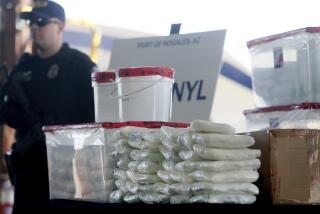Nations Team Up on Money Laundering
- Share via
WASHINGTON — Law enforcement authorities in the United States and 14 other nations have agreed to combat money laundering as an international crime that contributes to traffic in illicit narcotics, according to a report released Thursday by the Treasury Department.
However, the participating nations have been unable to agree on whether banks and other financial institutions should be required by law to report suspicious transactions to law enforcement officers, the report said.
The document, an outgrowth of last year’s economic summit in Paris, estimated that sales of cocaine, heroin and other illicit drugs amount to $122 billion a year in the United States and Europe. That, in turn, yields up to $85 billion annually in illegal profits available for laundering and investment by drug traffickers, the study said.
Deputy Treasury Secretary John E. Robson said the year-long study by the Financial Action Task Force on Money Laundering was being released simultaneously in the United States and the 14 other countries: Canada, France, West Germany, Italy, Japan, Great Britain, Austria, Australia, Belgium, Luxembourg, the Netherlands, Spain, Sweden and Switzerland.
Robson said he hoped that member governments would formally adopt the report at this summer’s economic summit in Houston. The law enforcement group’s work “will facilitate greater cooperation in international investigations, prosecutions and property seizures,” Robson said.
While stressing the need for greater international cooperation, the report acknowledged that “a divergence of opinion” exists among member nations on the obligation of bankers to report suspected crimes.
Although money laundering is a crime in the United States and several other countries, not all nations have followed the lead of the United States in requiring banks to report suspicious cash transactions, it said.
U.S. law requires financial institutions to report international cash transfers of $10,000 or more so they can be fed into a computer that studies suspicious patterns of transactions.
Domestic withdrawals or deposits of $10,000 or more in cash also must be reported by banks and certain other businesses.
However, the report stated that only “a few countries strongly believe that this reporting should be mandatory, possibly restricted to suspicious or serious criminal activities, and with administrative sanctions available for failure to report.”
Noting the concerns of some officials in nations with strict bank secrecy laws, the report said “there should be legal provisions to protect financial institutions and their employees from criminal or civil liability for breach of any restriction on disclosure of information.”
Robson said recommendations were not always adopted unanimously by the task force. But he declined to reveal which nations had opposed mandatory reporting rules for banks.
In an apparent slap at the practices of some Swiss banks, the report also declared that “financial institutions should not keep anonymous accounts or accounts in obviously fictitious names.”
More to Read
Sign up for Essential California
The most important California stories and recommendations in your inbox every morning.
You may occasionally receive promotional content from the Los Angeles Times.













